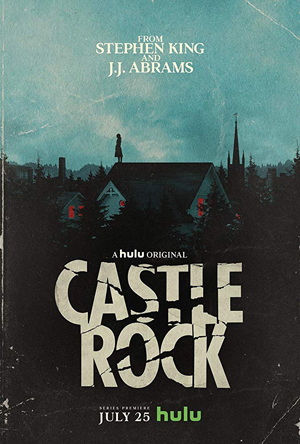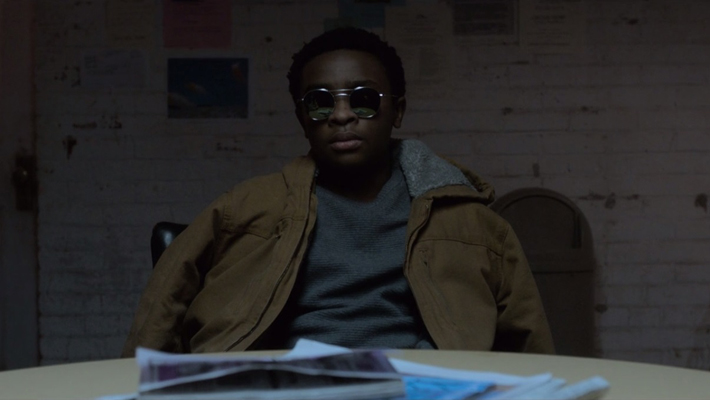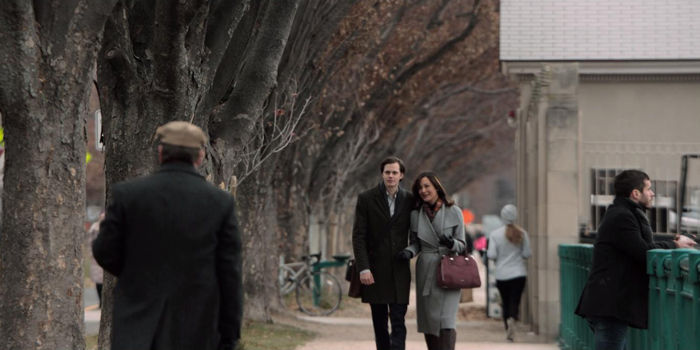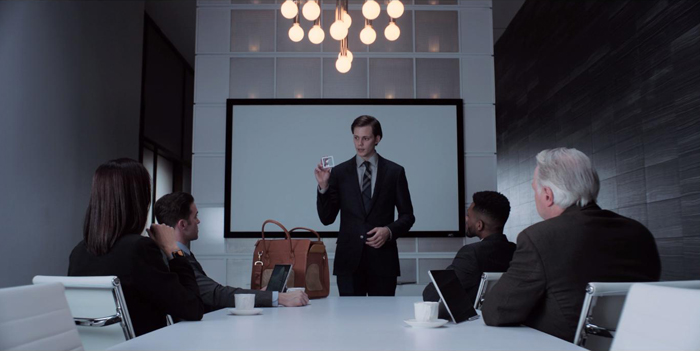
For your consideration (because I have no real answers): What are we owed from a horror adaptation? And what do we owe it in turn? Certainly we expect something different from a horror television show than we expect from a horror movie. A movie – even a longer one, like Hereditary – has an established, finite amount of time to tell an encapsulated story. Be it good or bad, there will be a beginning, a middle and an end, and you can make a reasonable guess as to when those things will individually occur. A series, however, is a bit different. It has space, sprawl… and expectations may vary wildly from one watcher to the next.
I’m getting a bit heady here, but the reason, dear friends, I’m going down this particular rabbit hole, no bottom in sight, is that Castle Rock is coming to a close, and I have some legitimate concerns about its finale – and don’t you worry your pretty heads, they will be discussed in full and detail – but I also find myself wondering if it really qualifies as a horror show, when it is so seldom actually frightening. Which takes me back to my original question: what are we owed? Should we anticipate every episode being scary in some capacity? This is certainly a greater challenge for a show with a broader arc, the way Castle Rock does, versus, say, The Twilight Zone, where each episode is independent. Perhaps, then, we wait for the whole to be revealed, and trust in the overall impact to land. I don’t know. I’ve been increasingly considering whether I would ever recommend that anyone watch Castle Rock episodically. I have been, and genuinely enjoying it, but I also wonder if it might not be more impactful as a binge; treat it as a 10 hour movie you can pause whenever you need to pee or grab a snack.

It may seem like I’m delaying talking about this week’s episode – andmake no mistake, there may in fact be an element of that, it’s sort of a difficult one to dive into – but this is very much a set-up episode. This is an episode that can only exist within the continuity of the show, and divorced from the grander context, it means nothing. Maybe a sort of creepy, fevered dream, but none of the graceful haunting of “The Queen” from two weeks ago, or the genuinely fun scares of last week’s episode. We learn that a theory I posited pretty early on – multiple timelines – is at play here, and yes, I did a rather obnoxious little victory dance in my chair. Doubly so when it turns out that another of my theories – that Henry and Skaars are in fact two parts of the same whole – also is proven correct.

This week’s episode posits that Skaars is ALSO Henry Deaver, just a Henry Deaver from an alternate Castle Rock, where his mother left his father and went to live a happy life with Alan, and Molly is successful and content, and the town is thriving. Skaars (who I refuse to refer to as Henry. Both because I still have some reservations and because this show already poses a unique set of challenges to write about, I do not need to throw in two characters with the same damn name) is living a fruitful, normal life, as an Alzheimer’s researcher, married and trying for a first born, when he gets a call that his dear old dad is – in the words of the Monarch – dear old dead. He goes back to Castle Rock, and discovers, dun-dun-dun, a boy in the basement of his father’s house. Alright, this should sound sort of familiar, and absolutely no one should be surprised to discover that boy is Henry as a child. Through listening to just an assload of tapes his father left behind, Skaars discovers that Henry had come to Matthew through the woods, telling him he finally heard the voice of God, and claiming over and over to be Henry. He knew things that only Henry would know but, in this reality, Ruth had already left with Henry. Also, in this reality, Henry would be little Skaars, and I really doubt that barring any radical cosmetic alterations, our beloved Swede ever looked like the Henry of our hearts, the one true Henry. Which, by the way, I’ve got questions about, and we’ll come back to. Anyway. Matthew is convinced that through wishing it to be so, he had willed the devil, in the guise of a sweet faced little boy, into Castle Rock, and things follow a similar pattern in this world to those in Henry’s. He is kept in a cage. He does not age. He causes chaos, through no actual fault of his own. This is the story we find out that Skaars is telling Molly, back in good old grimy Castle Rock. That in the other, sunnier Castle Rock, she and Skaars sprung Henry from state care, and took him back to the woods, and while there, stumbled into some sort of weird portal, where we see people suffering through different eras and times.

Alright, what? That’s an awful lot to unpack and understand, particularly if we take it at face value. But this is a story told by Skaars. Is he a reliable narrator? Do we have any reason to trust him, besides the fundamental fact that he’s hot, and we tend to trust hot people? This is not a good policy, and I do not recommend it. And it is, in fact, my sincere hope that we find out that at least some parts of this are not to be held as canonical. They simply wouldn’t make sense. Why is everyone else in the other version of Castle Rock identical physically to those we know in our Castle Rock, but Henry is so different? Why, in our Castle Rock, is Skaars held prisoner by Lacy and not Matthew, if their existences are so parallel? If Skaars is truly just another, confused version of Henry, what was the deal with his strange interactions with Ruth in “The Queen”? Why the hell does he only eat white Wonder Bread? Why would just those portraits of him cause such chaos? Also, why was Lacy painting all of those damn portraits? What about that weirdo barber who clearly had some connection to our Henry, and who had some sort of deeply upsetting people cage in his backyard?
I have previously alluded to questions that I absolutely need answered for this first season to have been successful. This latest episode gave life to so many more. I am prepared to go on good faith – the show has been careful and cogent and overall, pretty damn fun and watchable so far – but I have some concerns. A red herring or two is absolutely fine and acceptable, but these questions are fundamental to the fabric of the show. And if they aren’t addressed, any reasonable semblance of coherence is gone. Poof. And so is all of the goodwill built up over the season. It’s a lot of heavy lifting for a finale. Let’s hope they’ve got it in them.
